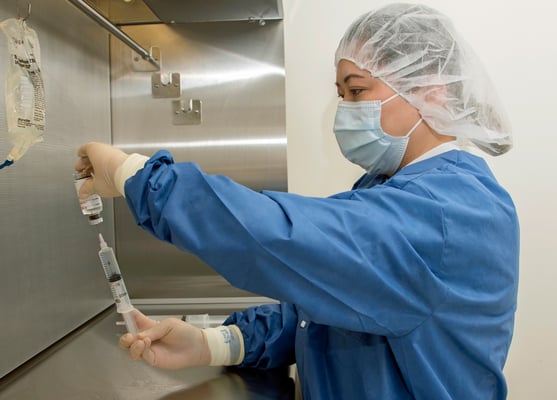Gilead Announced Results from Phase III Trial of Remdesivir

Michelle Mendoza, a pharmacy technician, reconstitutes the remdesivir research drug under an intravenous hood at Brooke Army Medical Center, Fort Sam Houston, Texas, April 29, 2020. Image credit: U.S. Army photo by Jason W. Edwards
Remdesivir is thought to be a prominent antiviral drug of COVID-19. Though much researches are left, amid the pandemic of SARS-CoV-2, different nations already give the approval to use remdesivir to decrease the severity of COVID-19. Currently, this is approved in Japan as a treatment for patients infected with SARS-CoV-2, the virus that causes COVID-19. Also, though this authorization is temporary, the U.S. Food and Drug Administration (FDA) granted remdesivir an Emergency Use Authorization for the treatment of hospitalized patients with severe COVID-19.
Remdesivir is a broad-spectrum antiviral medication developed by the biopharmaceutical company Gilead Sciences. As of 2020 COVID-19, this company, Gilead Sciences, Inc. (Nasdaq: GILD), has been continually in research and conducting a trial phase of remdesivir.
On June 01, 2020, Gilead made an announcement, through a press release, about the results from its phase III SIMPLE trial of remdesivir in human patients.
The study demonstrated a 5-day treatment course of remdesivir and that resulted in significantly greater clinical improvement.
Francisco Marty, MD, an infectious disease physician at Brigham and Women’s Hospital, and associate professor of medicine at Harvard Medical School said, "Our understanding of the spectrum of SARS-CoV-2 infection severity and presentations of COVID-19 continues to evolve. These study results offer additional encouraging data for remdesivir, showing that if we can intervene earlier in the disease process with a 5-day treatment course, we can significantly improve clinical outcomes for these patients."
In countries with a high prevalence of COVID-19, Gilead has already initiated SIMPLE - open-label and multi-center, phase III clinical trials of remdesivir. The studies were conducted at more than 180 trial sites around the world, including sites in the United States, China, France, Germany, Hong Kong, Italy, Japan, Korea, the Netherlands, Singapore, Spain, Sweden, Switzerland, Taiwan, and the United Kingdom.
In this phase III study of the clinical trial, hospitalized patients with confirmed COVID-19 infection and evidence of pneumonia without reduced oxygen levels were randomized (1:1:1) to receive open-label remdesivir for 5 or 10 days or standard of care alone.
The open-label study of remdesivir was conducted in courses of 5-day and 10-day courses with the standard of care, versus standard of care alone.
The study demonstrated a higher proportion, in fact, 65%, of patients in the 5-day remdesivir treatment group, were more likely to have clinical improvement on day 11 compared with those in the standard of care group. This adds up another hope in the course of an urgent search of COVID-19 antiviral/vaccine. In addition, non-statistically significant increases in clinical worsening or death were observed in the standard of care only group compared with the remdesivir groups.
Gilead Sciences plans to submit the full data for publication in a peer-reviewed journal in the coming weeks.
The team also observed some adverse effects where the most common are; 5 % of patients in both treatment groups were nausea (5-day: 10% / 10-day: 9% / SOC: 3%), diarrhea (5-day: 5% / 10-day: 5% / SOC: 7%) and headache (5-day: 5% / 10-day: 5% / SOC: 3%).
The SIMPLE trial runs in two steps. The first SIMPLE trial was designed to evaluate the safety and efficacy of 5-day and 10-day dosing durations of remdesivir administered intravenously in hospitalized patients with severe manifestations of COVID-19 and the second SIMPLE trial evaluates the safety and efficacy of 5-day and 10-day dosing durations of remdesivir administered intravenously in hospitalized patients with moderate manifestations of COVID-19, compared with standard of care.
Here in the first SIMPLE trial, the initial phase consists of randomized 397 patients in a 1:1 ratio to receive either a 5-day or a 10-day treatment course of remdesivir in addition to standard of care whereas in the second SIMPLE trial 600 patients were randomized in a 1:1:1 ratio to receive either a 5-day or a 10-day treatment course of remdesivir in addition to standard of care, compared with standard of care alone.
In the first SIMPLE phase, they conducted an expansion phase of the study and enrolled up to 5,600 additional patients, including those on mechanical ventilation. Similarly, in the second SIMPLE trial up to 1,000 additional patients with the moderate COVID-19 disease were added as an expansion phase.
The initial study results are announced in this press release, whereas the expansion phase is still in the process and the results are expected in the coming months.
Merdad Parsey, MD, Ph.D., Chief Medical Officer, Gilead Sciences said, "We now have three randomized, controlled clinical trials demonstrating that remdesivir improved clinical outcomes by several different measures. Today’s results showed that when treating moderate disease, a 5-day course of remdesivir led to greater clinical improvement than the standard of care, adding further evidence of remdesivir’s benefit to previously released study results. The National Institute of Allergy and Infectious Diseases’ placebo-controlled study showed that remdesivir enabled the more rapid recovery and that earlier treatment improved clinical outcomes. Our SIMPLE-Severe study showed that when treating patients with severe disease, 5 days of remdesivir led to similar clinical improvements as a 10-day course." Parsey added, "The additional data we have in hand today will further guide our research efforts, including evaluating treatment earlier in the course of the disease, combination studies with other therapies for the most critically ill patients, pediatric studies, and the development of alternate formulations."
Though some other important study and observations are required to officially claim that remdesivir will work as an antidote of the disease COVID-19, this results from phase III of clinical trial certainly hold us one step closer in search of COVID-19 antidote.
